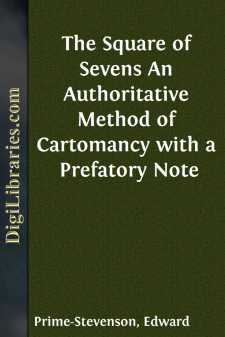Categories
- Antiques & Collectibles 13
- Architecture 36
- Art 48
- Bibles 22
- Biography & Autobiography 813
- Body, Mind & Spirit 142
- Business & Economics 28
- Children's Books 15
- Children's Fiction 12
- Computers 4
- Cooking 94
- Crafts & Hobbies 4
- Drama 346
- Education 46
- Family & Relationships 57
- Fiction 11829
- Games 19
- Gardening 17
- Health & Fitness 34
- History 1377
- House & Home 1
- Humor 147
- Juvenile Fiction 1873
- Juvenile Nonfiction 202
- Language Arts & Disciplines 88
- Law 16
- Literary Collections 686
- Literary Criticism 179
- Mathematics 13
- Medical 41
- Music 40
- Nature 179
- Non-Classifiable 1768
- Performing Arts 7
- Periodicals 1453
- Philosophy 64
- Photography 2
- Poetry 896
- Political Science 203
- Psychology 42
- Reference 154
- Religion 513
- Science 126
- Self-Help 84
- Social Science 81
- Sports & Recreation 34
- Study Aids 3
- Technology & Engineering 59
- Transportation 23
- Travel 463
- True Crime 29
The Square of Sevens An Authoritative Method of Cartomancy with a Prefatory Note
Categories:
Description:
Excerpt
Editorial Preface
"'Tis easy as lying."—Hamlet
It is safe to presume that even the most inquisitive book-hunters of the present day, and few of the fellowship during two or three generations past, have encountered the scarce and curious little volume here presented, as in a friendly literary resurrection—Robert Antrobus's "The Square of Sevens, and the Parallelogram." Its mathematical title hardly hints at the amusement that the book affords. With its solemn faith in the gravity of its mysteries, with its uncertain spellings and capital-icings such as belong to even the Eighteenth Century's early part, with its quaint phrases and sly observations (all the time sticking strictly close to business), it has a literary character, as well as me occult, that is quite its own.
Fortune-telling with cards and belief in fortune-telling with cards—like a hundred greater and lesser follies of the mind—were straws floating along the current of British life, intellectual and social, during the reign of George the Second. This was the case, in spite of the enlightening influences of religion, science, and philosophy. Modish society was addicted to matters over which argument was hardly worth while—in which respect we find modish society the same in all epochs. Our ancestresses particularly were often charming women, and almost as often sensible women; but, like the men of Athens, they were too superstitious. Often were they such in a fond and amusing degree. Lady Betty or Lady Selina—for that matter, even Sir Tompkin and my lord Puce—might be spirited men and women of the world. But they did not repudiate the idea of ghosts. They abhorred a mirror's breakage. They disliked a Friday's errand. They shuddered over a seven-times sneeze or at a howling dog at midnight. And the gentle sex, especially, would and did tell fortunes almost as jealously as play quadrille and piquet. Let us be courteous to them. Let us remember that Esoteric Buddhism, Faith Healing, and Psychic Phenomena were not yet enjoying systematic cultivation and solemn propagandism; and that relatively few dying folk were allowed to "go on with their dying" as part of a process of healing which excludes medicine and insists on the conviction that the invalids are not ill!
But to our "Square of Sevens"—with which even a Gallio may deign to be diverted—especially if in using it the air is found to be full of coincidences. The story of the book is already alluded to, as odd. The inquisitive reader may be referred to "certain copies only." Therein, "inserted by Afterthought on the Author's part" (and therefore in a mere fraction of whatever represented the extremely small edition of the work), may be sought the "Prefatory Explication, made for the Benefit of My Friends, Male and Female." In recounting the origin of the manual, its author is candid, but at the same time too long-winded for quoting entire. Enough to say, as the substitute for a lengthy tale of facts, that prior to the year 1731 the author of "The Square of Sevens," Mr....


